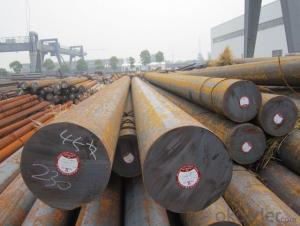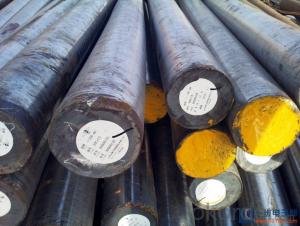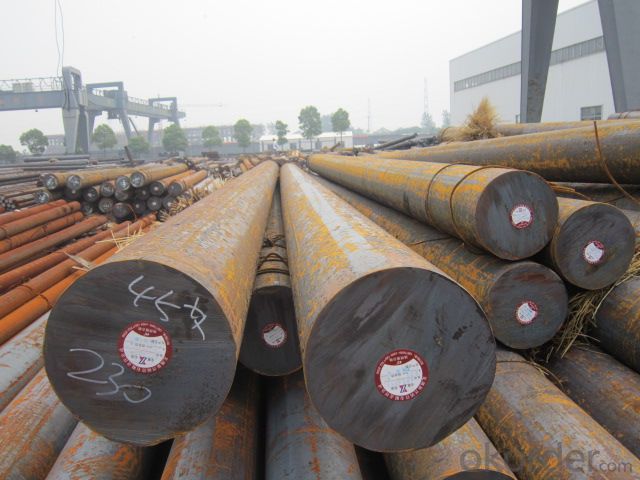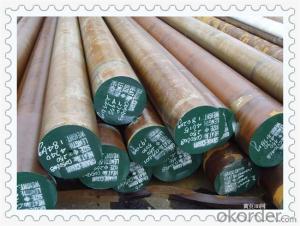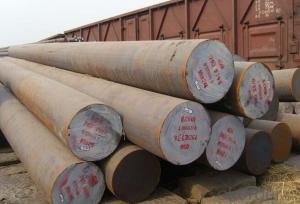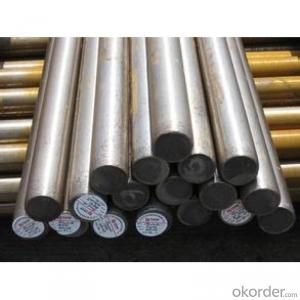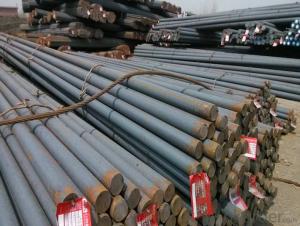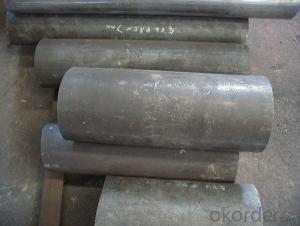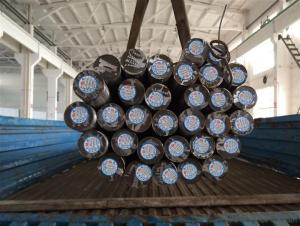Special Steel AISI 1010 Carbon Steel Round Bar
- Loading Port:
- China main port
- Payment Terms:
- TT OR LC
- Min Order Qty:
- 25 m.t.
- Supply Capability:
- 10000 m.t./month
OKorder Service Pledge
OKorder Financial Service
You Might Also Like
Specification
The details of our Steel
1. Produce Standard: as the GB, AISI, ASTM, SAE, EN, BS, DIN, JIS Industry Standard
2. Produce processes: Smelt Iron -EAF smelt Billet - ESR smelt Billet -Hot rolled or forged get the steel round bar and plate
3. Heat treatment:
Normalized / Annealed / Quenched+Tempered
4. Quality assurance:
All order we can received Third party inspection, You can let SGS, BV,.. and others test company test and inspect our products before Goods shipping.
Product information
1.Specification of aisi 1010 steel | ||||||||||||||||
Round bar | Diameter(mm) | Length (mm) | ||||||||||||||
100~300 | 2000~5800 | |||||||||||||||
Plate | Thickness(mm) | Width (mm) | Length (mm) | |||||||||||||
20~70 | 105~610 | 2000~5800 | ||||||||||||||
The specification can be customised! | ||||||||||||||||
2.Chemical compositon of aisi 1010 steel | ||||||||||||||||
NO. | C | Mn | Si | Cr | Cu | Ni | P | S | ||||||||
Aisi 1010 | 0.08~0.13 | 0.30~0.60 | 0.15~0.35 | ≤0.20 | ≤0.25 | ≤0.40 | ≤ 0.50 | |||||||||
DIN1.1191 | 0.42~0.48 | 0.6~0.9 | 0.15~0.35 | ≤0.15 | ≤0.3 | ≤0.2 | ||||||||||
JIS S45C | 0.42~0.50 | 0.5~0.8 | ≤0.40 | ≤0.40 | ≤ 0.4 | |||||||||||
GB45 | 0.42~0.50 | 0.5~0.8 | 0.17~0.37 | ≤0.25 | ≤0.25 | ≤0.3 | ≤0.035 | ≤0.035 | ||||||||
3. Mechanical properties of aisi 1010 steel | ||||||||||||||||
Annealing | Forging | Tempering and Hardening | Normalization | |||||||||||||
Subcritical annealing: 650~700 Isothermal annealing: 820~860 | 1100~850 | Tempering: 550~660 Hardening : 820~860 water | 840~880 | |||||||||||||
Main product
High speed steel | |
AISI | M2,M4,M35,M42,T1 |
DIN | 1.3343,1.3243,1.3247,1.3355 |
JIS | SKH51,SKH54,SKH35,SKH59,SKH2 |
Cold work tool steel | |
AISI | D2,D5,D3,D6,A8,A2,O1 |
DIN | 1.2379,1.2601,1.2080,1.2436,1.2631,1.2363,1.2510,1.2327 |
JIS | SKD10,SKD11,SKD1,SKS3 |
Hot work tool steel | |
AISI | H13,H11,H21 |
DIN | 1.2344,1.2343,1.2367,1.2581,1.2713 |
JIS | SKD61,SKD6,SKD7,SKD5SKT4 |
Plastic mould steel | |
AISI | P20,P20+Ni,420 |
DIN | 1.2311,1.2738,1.2083,1.2316 |
JIS | PDS-3,SUS420J1,SUS420J2 |
Alloy structural seel | |
AISI | 5140,4340,4135,4140 |
DIN | 1.7035,1.6511,1.7220,1.7225 |
JIS | SCr440,SNCM439,SCM435,SCM440 |
Stainless steel | |
AISI | 440C,420,430 |
DIN | 1.4125 |
JIS | SUS440C |
Carbon steel | |
AISI | 1045,1020 |
DIN | 1.1191 |
JIS | S45C, G3101 |
Product show

Workshop show

Shipping
1. FedEx/DHL/UPS/TNT for samples, Door-to-Door;
2. By Air or by Sea for batch goods, for FCL; Airport/ Port receiving;
3. Customers specifying freight forwarders or negotiable shipping methods!
Delivery Time: 3-7 days for samples; 5-25 days for batch goods.
Payment Terms
1.Payment: T/T, L/C, Western Union, MoneyGram,PayPal; 30% deposits; 70% balance before delivery.
2.MOQ: 1pcs
3.Warranty : 3 years
4.Package Informations: 1) EXPORT, In 20 feet (GW 25 ton) or 40 feet Container (GW 25 ton)
2)as customer's requirement
Why choose us?
(1) The leading exporter in China special steel industry.
(2) Large stocks for various sizes, fast delivery date.
(3) Good business relationship with China famous factories.
(4) More than 7 years steel exporting experience.
(5) Good after-sales service guarantee.
- Q: How is special steel used in the production of consumer goods?
- Special steel is used in the production of consumer goods primarily due to its enhanced properties such as strength, durability, and resistance to corrosion. It is commonly utilized in the manufacturing of various products like kitchen appliances, automobiles, power tools, and even jewelry. This type of steel allows for the creation of high-quality, long-lasting consumer goods that can withstand wear and tear, ensuring customer satisfaction and product longevity.
- Q: How does special steel perform in terms of chemical resistance?
- Special steel generally performs well in terms of chemical resistance. It is often designed to have high resistance to corrosion, oxidation, and chemical reactions with various substances. This attribute makes it suitable for applications in industries like oil and gas, chemical processing, and marine environments. However, the specific chemical resistance of special steel can vary depending on its composition and treatment, so it is important to consider the specific requirements and consult with experts when selecting the appropriate type of special steel for a particular application.
- Q: Can special steel be used in the chemical processing industry?
- Yes, special steel can be used in the chemical processing industry. Special steel alloys are designed to have excellent resistance to corrosion, high temperatures, and chemical reactions, making them suitable for use in various chemical processes. These steels can withstand harsh environments, such as exposure to corrosive chemicals, acids, and high-pressure conditions, ensuring the longevity and reliability of equipment and structures in the chemical processing industry.
- Q: How does special steel contribute to the manufacturing of fasteners?
- Special steel contributes to the manufacturing of fasteners by providing higher strength, durability, and corrosion resistance compared to regular steel. This allows fasteners to withstand heavy loads, vibrations, and harsh environmental conditions, ensuring their longevity and reliability in various applications. Additionally, special steel can be tailored to specific requirements, enabling the production of fasteners with precise dimensions, shapes, and surface finishes, thereby enhancing their performance and compatibility with different components and structures.
- Q: What are the different coating options available for special steel?
- Some of the different coating options available for special steel include galvanizing, powder coating, electroplating, and organic coatings such as epoxy or polyurethane. These coatings provide protection against corrosion, enhance durability, and improve the aesthetics of the steel.
- Q: How does special steel perform under extreme temperatures?
- Special steel has been specifically engineered to excel in extreme temperature conditions. It boasts outstanding strength, hardness, and heat resistance, making it an ideal choice for applications involving extreme heat or cold. When exposed to high temperatures, special steel maintains its structural integrity, avoiding significant deformation or loss of strength. It also retains its hardness and dimensional stability, ensuring that it can withstand extreme conditions without compromising its performance. One of the key properties of special steel is its exceptional resistance to thermal expansion and contraction. This is particularly important when faced with drastic temperature changes. By expanding and contracting uniformly, the steel minimizes the risk of cracking or other types of damage. Furthermore, special steel exhibits remarkable heat resistance, allowing it to preserve its mechanical properties even at elevated temperatures. It demonstrates high creep resistance, which means it can resist deformation under constant stress in high-temperature environments. This ensures that the steel can endure prolonged exposure to extreme heat without experiencing failure or degradation. Not only does special steel perform exceptionally well at high temperatures, but it also excels in extremely low temperatures. It maintains its toughness and ductility, with minimal risk of embrittlement or cracking. This makes it highly suitable for cryogenic environments in industries such as aerospace or medicine. In conclusion, special steel has been specifically designed to outperform in extreme temperature conditions, offering impressive strength, hardness, and heat resistance. Its ability to maintain structural integrity, resist thermal expansion and contraction, and withstand high or low temperatures make it a dependable choice for various demanding applications.
- Q: Can special steel be used in the paper manufacturing industry?
- Yes, special steel can be used in the paper manufacturing industry. Special steels, such as stainless steel, can be used to make various components and equipment used in the paper manufacturing process. These steels offer excellent corrosion resistance, high strength, and durability, making them suitable for applications like paper machine parts, rollers, blades, and screens. Additionally, special steels can withstand high temperatures and mechanical stress, enhancing the overall efficiency and reliability of paper manufacturing operations.
- Q: Can special steel be used in the marine industry?
- Yes, special steel can be used in the marine industry. Special steel, such as stainless steel or corrosion-resistant steel, is often preferred in marine applications due to its high resistance to corrosion from saltwater and harsh environmental conditions. It is commonly used in the construction of ships, offshore structures, and marine equipment to ensure durability and longevity.
- Q: Can special steel be used in the agricultural sector?
- Yes, special steel can be used in the agricultural sector. Special steel refers to steel alloys that have been specifically designed and engineered to possess certain unique and superior qualities. These qualities can include increased strength, corrosion resistance, wear resistance, and heat resistance, among others. In the agricultural sector, there are several applications where special steel can be highly beneficial. One such application is in the manufacturing of agricultural machinery and equipment. Special steel can be used to produce components such as blades, cutting edges, plowshares, and tillage tools that need to withstand heavy loads, abrasion, and harsh environmental conditions. The high strength and wear resistance of special steel can significantly extend the lifespan of these components, reducing maintenance and replacement costs for farmers. Additionally, special steel can be used in the construction of storage facilities and infrastructure in the agricultural sector. Structures such as grain silos, barns, and livestock shelters often require materials that can resist corrosion from moisture, chemicals, and animal waste. Special steel alloys with enhanced corrosion resistance properties can provide a durable and long-lasting solution, allowing farmers to store their crops and livestock in a safe and secure environment. Furthermore, special steel can be utilized in the fabrication of irrigation systems and pipelines. These systems require materials that can withstand exposure to water, soil, and fertilizers without degradation or corrosion. Special steel grades with excellent corrosion resistance, such as stainless steel, can be utilized to ensure the longevity and efficiency of irrigation systems, reducing water wastage and increasing agricultural productivity. In conclusion, special steel can indeed be used in the agricultural sector due to its superior qualities such as strength, corrosion resistance, wear resistance, and heat resistance. Its applications range from manufacturing agricultural machinery and equipment to constructing storage facilities and irrigation systems. By utilizing special steel, farmers can benefit from increased durability, reduced maintenance costs, and improved efficiency, ultimately contributing to the growth and sustainability of the agricultural sector.
- Q: What are the requirements for special steel used in chemical processing?
- The requirements for special steel used in chemical processing are generally more stringent compared to regular steel due to the harsh and corrosive nature of the chemicals involved. Some of the key requirements for special steel in chemical processing include: 1. Corrosion resistance: Special steel used in chemical processing must exhibit high resistance to corrosion from acids, alkalis, and other corrosive chemicals. This is achieved by adding alloying elements such as chromium, nickel, and molybdenum, which form a protective oxide layer on the surface of the steel, preventing it from reacting with the chemicals. 2. High temperature resistance: Chemical processing often involves high-temperature reactions. Therefore, special steel used in this industry must have excellent heat resistance to maintain its strength and structural integrity at elevated temperatures. This is achieved by adding elements like chromium, nickel, and tungsten, which help in maintaining the stability of the steel at high temperatures. 3. Mechanical strength: Special steel used in chemical processing should possess sufficient mechanical strength to withstand the pressures and loads encountered in the process equipment. This requirement is met by adding alloying elements such as manganese, silicon, and carbon, which enhance the steel's strength and toughness. 4. Weldability: Weldability is a crucial requirement for special steel used in chemical processing as it allows for easy fabrication and installation of process equipment. Special steel with good weldability ensures strong and reliable joints, which are essential for the safe and efficient operation of chemical plants. 5. Resistance to stress corrosion cracking: Stress corrosion cracking is a significant concern in chemical processing environments. Therefore, special steel used in this industry should have good resistance to stress corrosion cracking, which is achieved by carefully selecting the alloying elements and controlling the material's microstructure. 6. Cleanliness: Special steel used in chemical processing should be free from impurities and have a low content of harmful elements that could contaminate the process or react with the chemicals. This necessitates strict quality control measures during steel production to ensure the desired cleanliness and purity. Meeting these requirements ensures that special steel used in chemical processing can withstand the aggressive chemical environment, high temperatures, and mechanical stresses encountered in the industry, leading to safe and reliable operation of the process equipment.
Send your message to us
Special Steel AISI 1010 Carbon Steel Round Bar
- Loading Port:
- China main port
- Payment Terms:
- TT OR LC
- Min Order Qty:
- 25 m.t.
- Supply Capability:
- 10000 m.t./month
OKorder Service Pledge
OKorder Financial Service
Similar products
Hot products
Hot Searches
Related keywords
